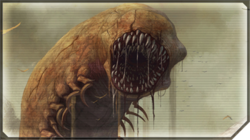|
|
| (One intermediate revision by the same user not shown) |
| Line 19: |
Line 19: |
| }} | | }} |
|
| |
|
| The '''Sandworm''' of [[Antenora]] is one of the powerful monsters left behind in the [[Cocytus System]] by the [[starwars:Infinite Empire|Infinite Empire]]. A long powerful body the burrows through the sand wastes of Antenora, it was awoken by Pacre Datship leader, Emperor Vanis, in 39 ABY. | | The '''Sandworm''' of [[Antenora]] is one of the powerful monsters left behind in the [[Cocytus System]] by the [[starwars:Infinite Empire|Infinite Empire]]. A long powerful body the burrows through the sand wastes of Antenora, it was awoken by Pacre Datship leader, Emperor Vanis, in 39 ABY. Following its apparent destruction, Imperial Scientists began to analyse the data they gathered on the beast. It was given the scientific name of '''Huludus Lucyethic''', named after [[Lucyeth|Lucyeth]] for his incredible efforts during the Monstrosity event. |
|
| |
|
| ==History== | | ==History== |
| Line 25: |
Line 25: |
|
| |
|
| On the desert planet of Antenora, looking to augment their own genetic makeup as a means to true immortality, they focused on the long term survivability of insects in harsh environments. | | On the desert planet of Antenora, looking to augment their own genetic makeup as a means to true immortality, they focused on the long term survivability of insects in harsh environments. |
| | |
| | Attempts to kill the worm from the air were unsuccessful. It quickly disappeared beneath the sands of Antenora following the reversal of the awakening ritual. |
|
| |
|
| ==Description and Abilities== | | ==Description and Abilities== |
| Line 32: |
Line 34: |
| When near the surface, it kicks up a wall of choking sand in its wake. Burrowing deeper into the earth makes it hard to detect, with warnings of its approach only coming from the gentle rumbling of the earth. | | When near the surface, it kicks up a wall of choking sand in its wake. Burrowing deeper into the earth makes it hard to detect, with warnings of its approach only coming from the gentle rumbling of the earth. |
|
| |
|
| [[Category:Creatures]][[Category:Scholae Palatinae]][[Category:[[Category:Scholae Palatinae NPCs]] | | [[Category:Creatures]][[Category:Scholae Palatinae NPCs]] |
Latest revision as of 23:32, 11 May 2017

|
| Antenora Sandworm
|
|
Worm
|
|
Antenora
|
|
1,300 ft (396 m)
|
|
Tan
|
- Mouth of Multiple rows of Jagged Teeth
|
The Sandworm of Antenora is one of the powerful monsters left behind in the Cocytus System by the Infinite Empire. A long powerful body the burrows through the sand wastes of Antenora, it was awoken by Pacre Datship leader, Emperor Vanis, in 39 ABY. Following its apparent destruction, Imperial Scientists began to analyse the data they gathered on the beast. It was given the scientific name of Huludus Lucyethic, named after Lucyeth for his incredible efforts during the Monstrosity event.
History
Sometime around 30,000 BBY, at the height of the Infinite Empire, many of their best scientists took up residence within the Cocytus System, turning it into a multi-planet laboratory to study the mysteries of life itself.
On the desert planet of Antenora, looking to augment their own genetic makeup as a means to true immortality, they focused on the long term survivability of insects in harsh environments.
Attempts to kill the worm from the air were unsuccessful. It quickly disappeared beneath the sands of Antenora following the reversal of the awakening ritual.
Description and Abilities
The giant sandworm of Antenora, long and fast at burrowing through the earth blends in perfectly with the colors of sand and stone on the planet. More than a simple worm, it has many appendages, similar to a centipede, with a thick chitin exoskeleton. Its gaping maw is capable of opening to nearly the full diameter of its body.
When near the surface, it kicks up a wall of choking sand in its wake. Burrowing deeper into the earth makes it hard to detect, with warnings of its approach only coming from the gentle rumbling of the earth.